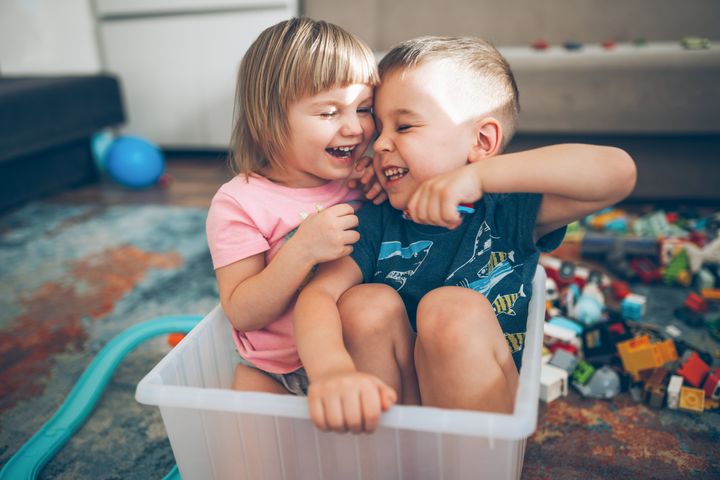News
How To Raise Kids Who Actually Like Each Other
Sitting between his two older sisters, Rhys Tsiang, a 16-year-old from New Jersey, said, “They kind of just feel like I’m with my friends when I’m with them.”
The three siblings ― Rhys, Kobie Tsiang, 22, and Nori Tsiang, 20 ― often hang out together in Kobie’s bedroom, which she described as “our communal space.”
“I have a TV in here,” Kobie Tsiang said. “We’ll all come in here. We’ll talk, we’ll walk in without knocking, often. I’d say that we’re pretty close. I’d say that we hang out pretty regularly and probably more than other siblings do in general.”
The Tsiang siblings told HuffPost that they feel closer now than earlier in their lives, when they faced some of the typical sibling conflicts and resentments.
“I did find my younger brother to be slightly annoying,” Nori Tsiang admitted, speaking of her 11-year-old self. Today, the pair often spend time hanging out together with mutual friends.
“I don’t think we were that close when we were younger. I think it’s changed a lot, though,” Rhys said.
Having the space to build their own authentic relationships with each other, as well as having regular time to spend together, such as on annual family vacations, has helped shape the bond the siblings share today.
Building sibling dynamics can be difficult when you’re a parent. But there are steps you can take to ensure that your children have a strong relationship with one another.
We asked a couple of experts what parents can do to raise siblings who actually like each other.
Anastasiia Sienotova via Getty Images
Don’t confuse a good relationship with a conflict-free one.
Liking someone doesn’t mean that you don’t ever fight with them.
“Expecting your kids to like each other is a reasonable goal. I think that’s different from expecting them to not fight with each other,” psychologist Janine Domingues of the Child Mind Institute told HuffPost.
Instead of worrying that your kids’ conflicts will damage their relationship, focus on helping them find a way to resolve the problem at hand. You don’t need to worry that a fight today will ruin their chances of being close to one another later in life.
Topsie VandenBosch, a 35-year-old from Los Angeles, said she and her 26-year-old sister, Pjay Togunde, had “sisterly fights and disagreements” while growing up. As they matured and became adults, their nine-year age gap became less of a divide, and VandenBosch now describes her little sister as “one of my best friends and my rock.”
“My relationship with Topsie now is solid,” she told HuffPost.
Set high expectations.
If you expect your children to get along with one another, they’re actually more likely to do so, Laura Markham, a psychologist and the author of several parenting books, told HuffPost.
“If you expect them not to get along, like if you had problematic relationships with your siblings, they are more likely to have more problems,” Markham said. “If you hold it as a family value that we’re family, we can get mad at each other, we can fight — we always work things out. We protect each other and support each other. That will be the value that kids learn about siblings.”
Markham said it’s important to not bring your own baggage from your sibling relationships to your kids, neither assuming that things will be bad nor trying to replicate a relationship you feel is perfect. In addition, you need to cultivate a strong relationship with each of your children individually.
“The research on this is that if you, the parent, have a positive relationship with each child, they’re much more likely to have a positive relationship with each other,” she said.
Kids need reassurance that you love and accept them just as much as their siblings — even when they’re being difficult.
“The most important thing you can do is really work on your relationship with each child, so that each child feels like no matter how much love you give their sibling, there’s more than enough for them,” Markham said.
One way to do this is to schedule special one-on-one time with each child, even if it’s only for five or 10 minutes. Children relish having your full attention.
Also, remember that the way you treat your children is likely the way they will learn to treat each other.
“If your discipline runs to the authoritarian style, you will see your kids be meaner to each other,” Markham said, and you may overhear them repeating phrases you’ve said, like, “Do what I say right now.”
But if you work on setting limits in a more collaborative way, your kids are more likely to follow suit.
“Your model around how problems get solved will communicate itself to your kids,” Markham said.
Praise the kind of behavior you want to see.
It’s easy to get caught up in stopping fights and unkind behaviors, but don’t forget to praise your kids when they display the kind of behavior you want to see more of.
Domingues called this “label praising,” where you name the positive behavior and give it your praise.
“Whether they’re playing nicely with each other or sharing together, or if they’re older and just watching something together or interacting together in a way that fosters good sibling togetherness, it’s really being able to praise that and sort of shout that out,” Domingues said.
With a young child, this might sound like, “Thank you for sharing your toy with your sister. That was wonderful of you to do,” she continued.
With an older child, you might say, “I really loved how you spent some time just talking to your sister. I think she really loved that,” or “Thanks so much for driving your brother to school this morning. It helps me, and I think he really loves it when you do that,” Domingues said. In these examples, not only is the parent praising the behavior but also noting its positive impact on the sibling.

kate_sept2004 via Getty Images
Set up family routines that encourage closeness.
“Having family traditions has a multitude of benefits,” Domingues said. This can include the traditional family dinner, but it could also be a special Sunday morning breakfast if that’s what works for your family schedule-wise.
“Start early and start young, so it’s baked into things that they actually look forward to and want to continue to do,” Domingues said.
Markham gave the example of having an older sibling read a bedtime story to a younger sibling every night. Her own children, she said, found that the activity they liked to do together was sword fighting.
The Tsiang siblings recalled family vacations to the Jersey Shore, where, without their friends around, they would do things like play volleyball together.
“The research shows that the more positive interactions kids have when they’re growing up together, the better their relationship with each other as adults,” Markham said, while noting that this does not mean they won’t fight sometimes.
VandenBosch and Togunde credit their parents for encouraging them to spend time together and stay in touch.
“On a typical Friday night, they would prefer for me to usually hang out with my sisters in the house or go see them at college rather than spend time with friends from school,” Togunde said.
“They consistently encourage us to call or text each other often,” she continued. “If I were to tell them that I went two weeks without talking to my sisters, they would be disappointed.”
Give kids space to express their feelings about having siblings.
While there are some kids that simply rub each other the wrong way from the get-go, Markham said the most frequent reason she sees siblings don’t get along is because parents “don’t understand how to help the older child with the feelings that come up.”
Knowing that such feelings of jealousy are practically universal, parents may assume that they’ll subside in due time, but this may not be the case. And when they linger, it can sour the sibling dynamic.
“It’s really important to make sure that the older kid has the opportunity not just to spend one-on-one time with you but to tell you how they feel. If you notice that they’re not telling you, but they seem to be handling the new baby a little roughly or climbing on the table to get attention or whatever, you can say, ‘It must be hard sometimes to be the big sister,’” Markham said.
“What you can do is listen and acknowledge,” she continued, noting that parents may avoid the topic because it makes them feel defensive or guilty. But she has seen how allowing kids to have their feelings and talk about them can be an effective way to manage behavior issues.
This doesn’t mean that you allow an older child to say cruel or unkind things to their sibling, but they can express this anger and jealousy when talking to you.
When one sibling says something negative about the other to you, you can use “part of” language to both validate their feelings and reaffirm your faith that their bond will be strong. Markham suggested using phrases such as, “I know part of you sometimes wishes that even though part of you loves your brother, part of you wishes that you could be an only sibling.”
With a parent’s support, kids can overcome periods of jealousy or not feeling close to each other.
As they look forward to graduations and the beginnings of their careers, the Tsiang siblings plan on remaining a presence in each other’s lives. Kobie and Nori Tsiang intend to even move into their first apartment together one day.
“Me and her are definitely going to stick together, and Rhys will still be around,” Kobie Tsiang said. “Our big American dream is to buy a plot of land somewhere rural and build a bunch of little houses for us and our family.”
Read more

